Emad Shehab: dedicated colleague remembered for his service
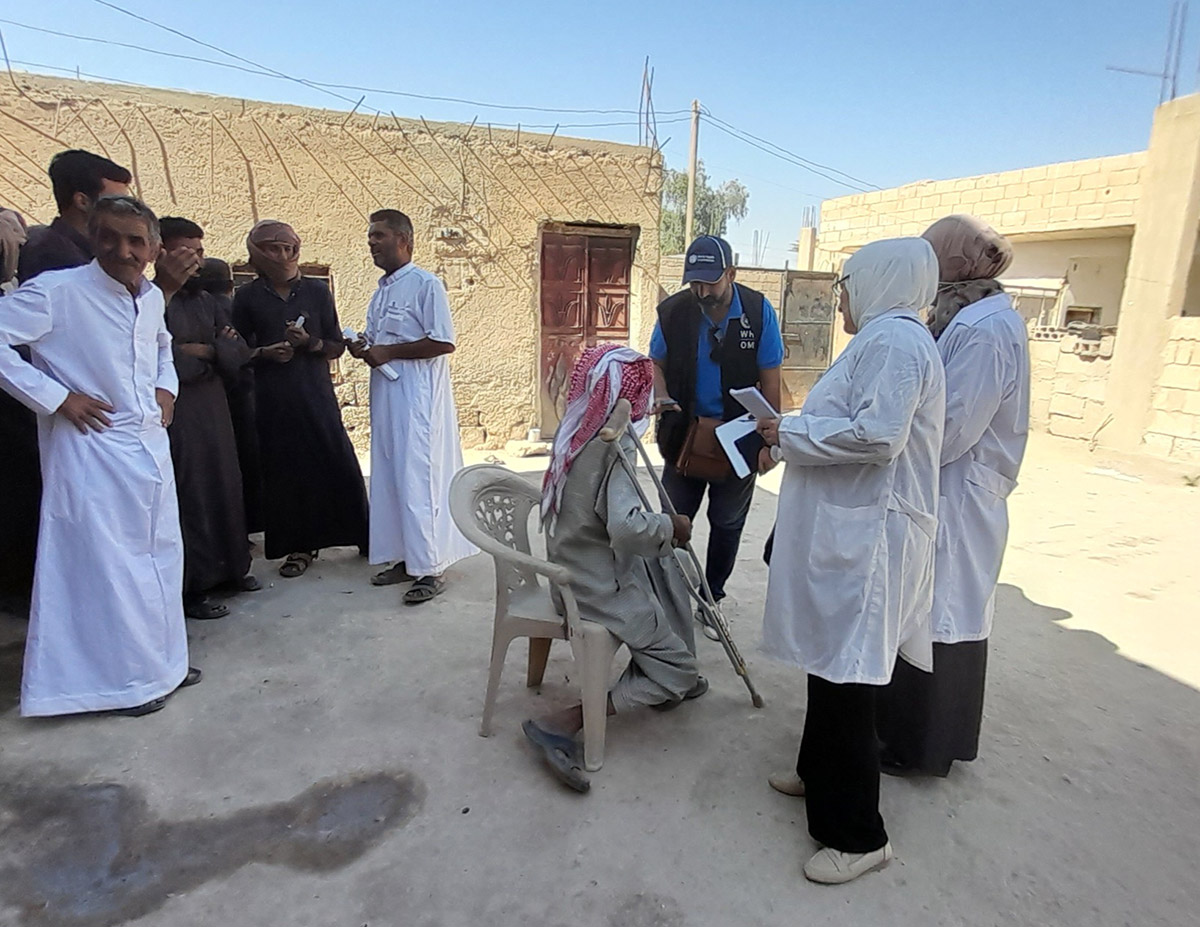 Photo caption: Emad Shehab actively engaging with community members during a cholera awareness campaign in Al-Ashara, Deir-ez-Zor Governorate, Syria, 2023. Photo credit: @WHO
Photo caption: Emad Shehab actively engaging with community members during a cholera awareness campaign in Al-Ashara, Deir-ez-Zor Governorate, Syria, 2023. Photo credit: @WHO
19 August 2024, Damascus, Syria – Emad Shehab, killed after a building collapsed following an airstrike in his hometown Deir-ez-Zor, was a public health emergency specialist and engineer whose expertise and dedication served as an inspiration to everyone who worked with him.
"Emad was a dedicated professional whose commitment greatly impacted our response in Syria. We deeply feel his loss, and his legacy continues to inspire our work. We are committed to carrying on the vital work he championed and honouring his memory,” said Dr Iman Shankiti, WHO Representative a.i in Syria.
Emad started working at WHO in 2022 as a water, sanitation and hygiene (WASH) focal point in Deir-ez-Zor. His expertise led to critical improvements in WASH conditions at health facilities where he spearheaded vital water quality monitoring efforts and addressed significant public health hazards. Imad’s leadership in installing solid waste treatment units at Al Assad Hospital and Al-Hamidiya Health Centre was crucial in mitigating epidemic risks, making significant contributions to public health and environmental safety in challenging circumstances.
"Emad was a loving and caring husband and father of two children, Jad, 4, and Sham, 9. Even now Jad asks me 'when will Dad come back from his trip? I miss him so much,' and I don't know how to reply," says Imad's widow Om Jad.
"My daughter Sham had a special relationship with her father. She watched him prepare blueprints for projects and she started to draw sketches of his work. He always supported and guided her. Now that he has passed away, she wants to be like her dad when she grows up so he can be proud of her."
Emad earned a bachelor’s degree in architectural engineering from Aleppo University in 2004. Before joining WHO, he gained extensive experience in engineering and project management, working with FAO, WFP, UNICEF and several NGOs on the construction and rehabilitation of water stations and sanitation facilities.
Emad showed unwavering devotion to his work and his family. His exemplary approach to humanitarian work and human relationships left a lasting impact on everyone he encountered, whether acquaintances or strangers. As Imad’s dedication and compassion continue to inspire us, we will honour his memory by carrying forward the vital work he was so passionate about. His loss is deeply felt by all of us who were fortunate enough to know him.
Large-scale scabies response in north-west Syria targets 71 camps and 7 communities
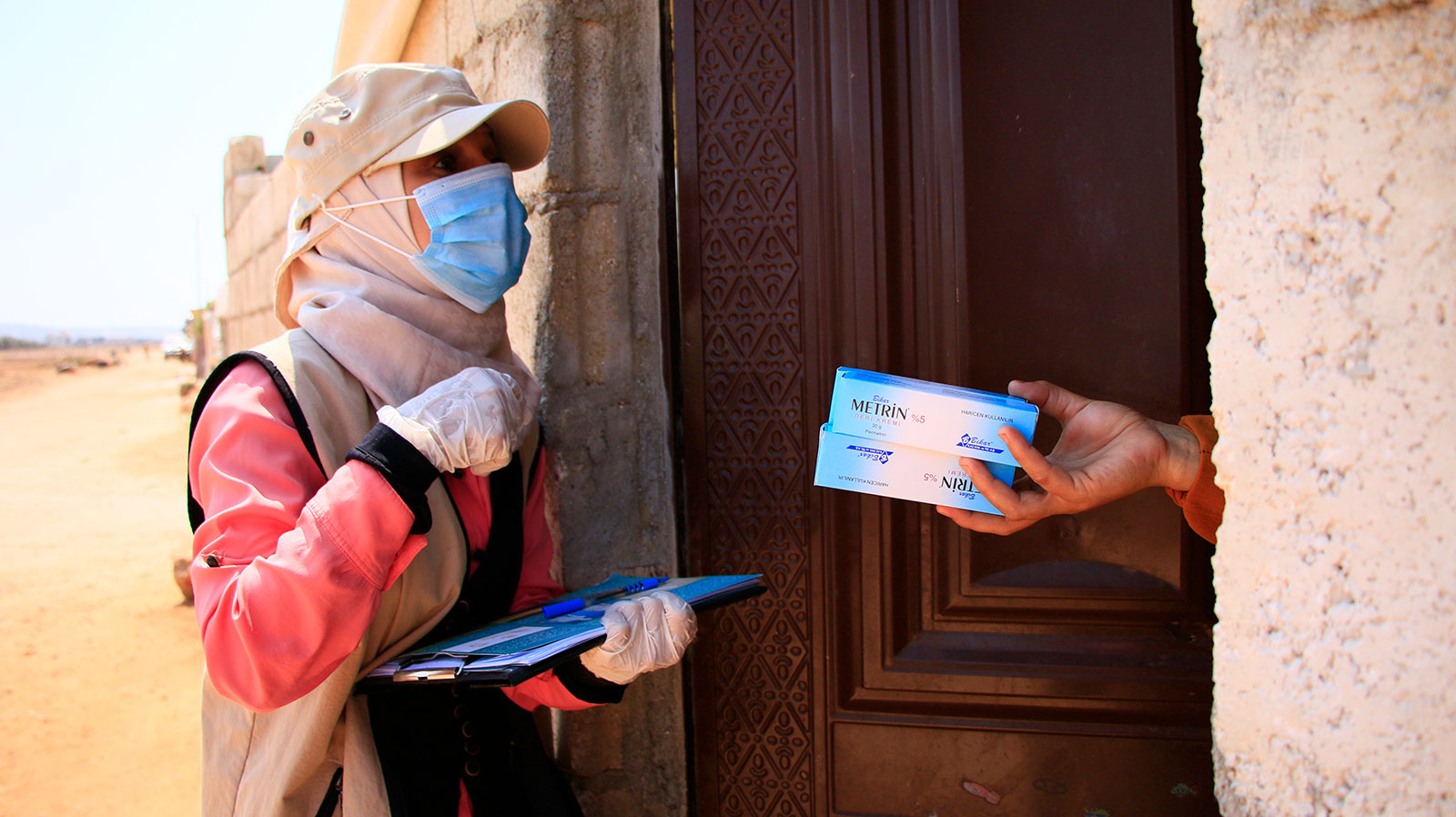 Door-to-door distribution of permethrin cream in camps as part of the scabies response in north-west Syria. Photo credit: © Al-Sham Humanitarian Foundation 4 August 2024 – In north-west Syria, lack of sanitation services, compounded by limited water supply and overcrowding, creates the ideal conditions for infectious diseases to spread. Scabies is among the infections of concern in north-west Syria, especially in densely populated camps as it is transmitted person to person through close skin contact.
Door-to-door distribution of permethrin cream in camps as part of the scabies response in north-west Syria. Photo credit: © Al-Sham Humanitarian Foundation 4 August 2024 – In north-west Syria, lack of sanitation services, compounded by limited water supply and overcrowding, creates the ideal conditions for infectious diseases to spread. Scabies is among the infections of concern in north-west Syria, especially in densely populated camps as it is transmitted person to person through close skin contact.
WHO collaborated with the United Nations Children’s Fund (UNICEF) and Health and WASH (Water, Sanitation and Hygiene) Cluster partners to launch a permethrin-based mass drug administration on 16 July 2024. This large-scale response to scabies has been made possible thanks to financial support from European Union Humanitarian Aid.
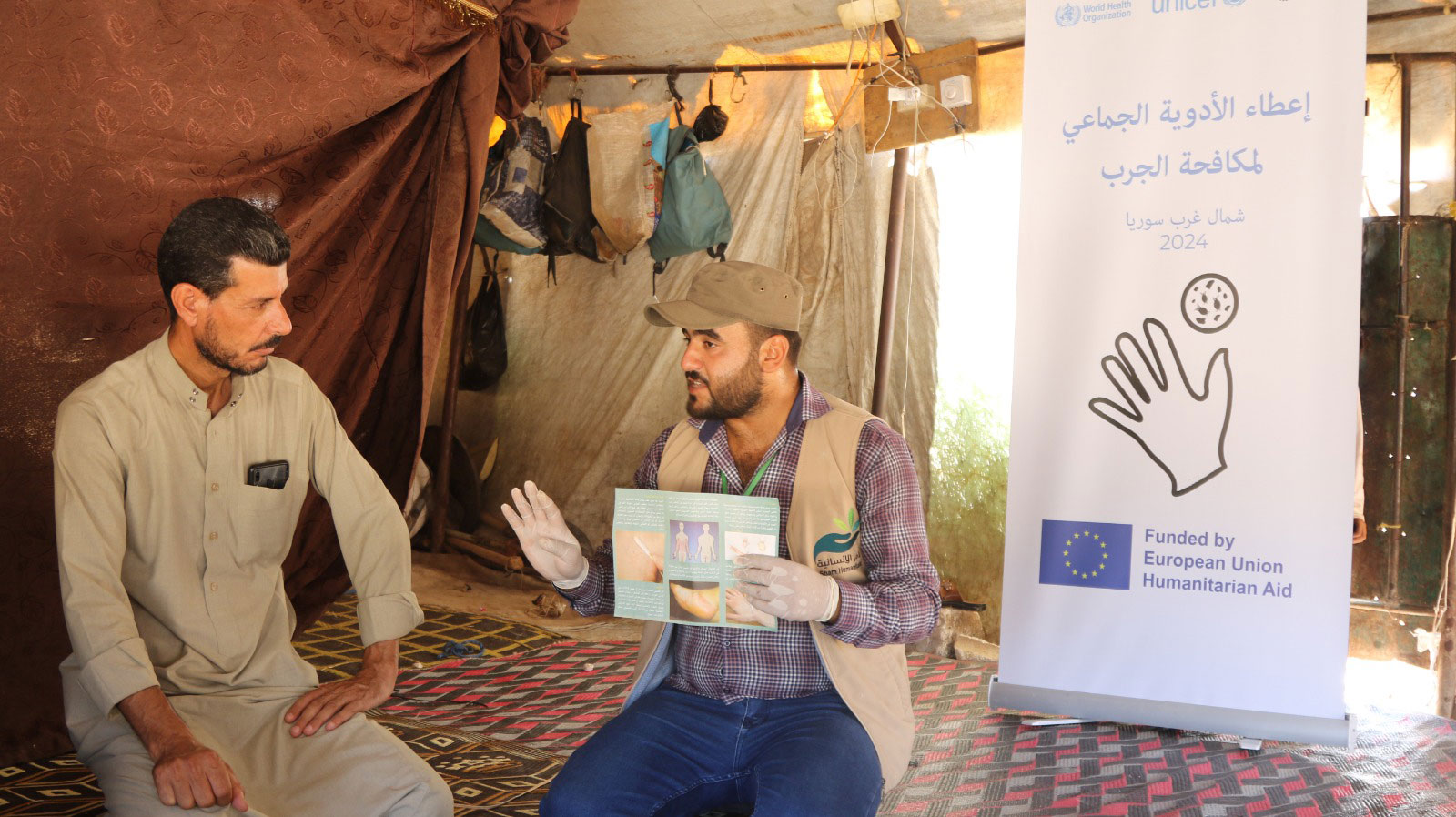 Community health workers raise awareness among families living in camps on how to treat and prevent scabies. Photo credit: © Al-Sham Humanitarian Foundation The campaign will last for 21 days and target more than 180 000 people in 71 camps and 7 communities. Partners have also distributed UNICEF-procured hygiene kits and trained community workers and hygiene promoters in how to treat scabies and prevent its further spread.
Community health workers raise awareness among families living in camps on how to treat and prevent scabies. Photo credit: © Al-Sham Humanitarian Foundation The campaign will last for 21 days and target more than 180 000 people in 71 camps and 7 communities. Partners have also distributed UNICEF-procured hygiene kits and trained community workers and hygiene promoters in how to treat scabies and prevent its further spread.
“In north-west Syria, an estimated 2 million people are living in overcrowded camps with poor living conditions. This presents a huge risk for the spread of scabies. We are very grateful to the European Union for its support in helping to curb the spread of scabies through this mass drug distribution,” said Ms Rosa Crestani, Team Lead for the WHO Field Presence Office in Gaziantep, Türkiye.
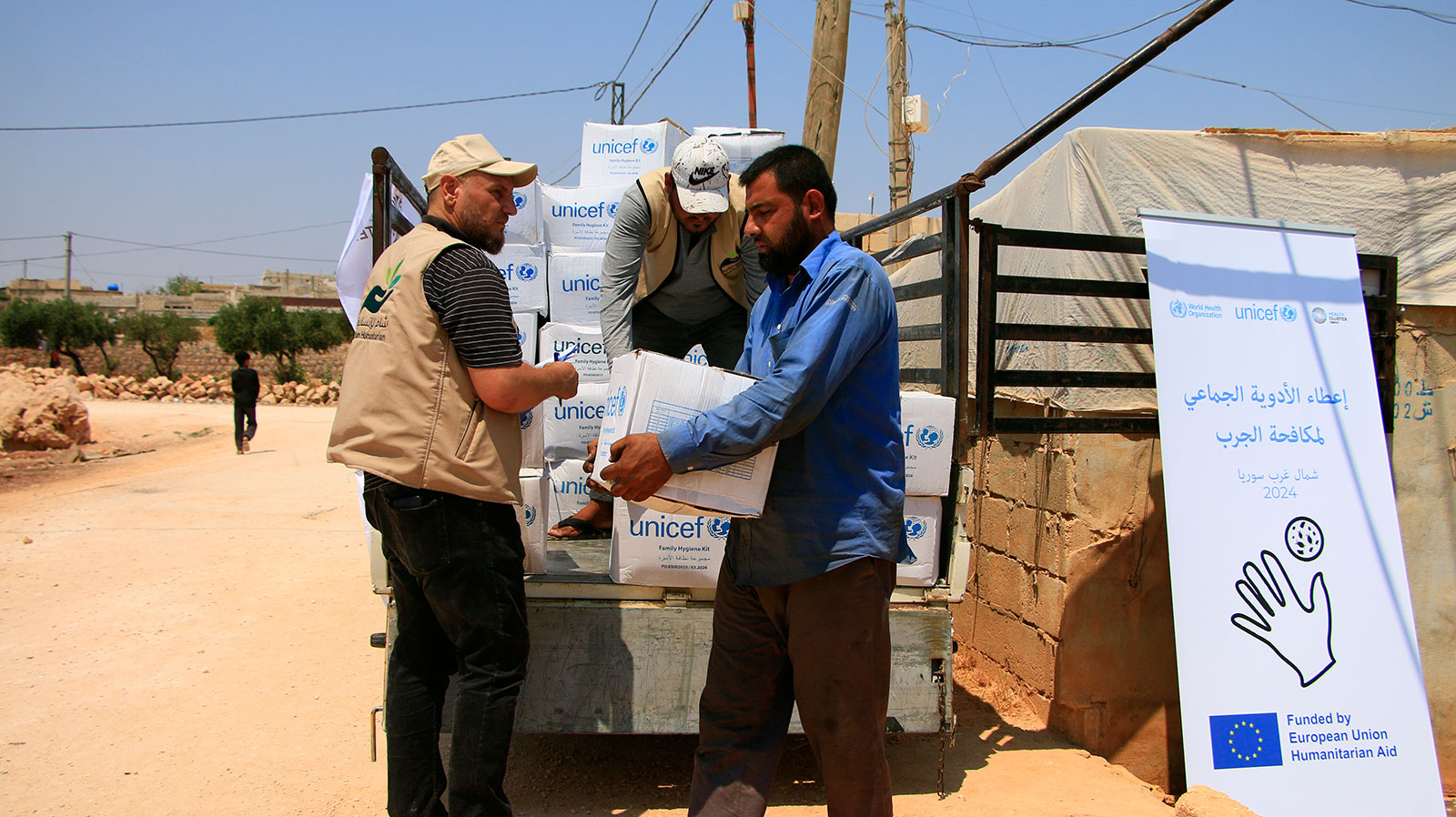 UNICEF-procured hygiene kits are distributed as part of the scabies response in north-west Syria. Photo credit: © Al-Sham Humanitarian Foundation WHO carried out a comprehensive scabies community survey exercise in north-west Syria in December 2023. This revealed a high prevalence of scabies, surpassing the 10% community transmission threshold set by WHO, with higher rates reported in camps.
UNICEF-procured hygiene kits are distributed as part of the scabies response in north-west Syria. Photo credit: © Al-Sham Humanitarian Foundation WHO carried out a comprehensive scabies community survey exercise in north-west Syria in December 2023. This revealed a high prevalence of scabies, surpassing the 10% community transmission threshold set by WHO, with higher rates reported in camps.
People living in camps were found to be 7 times more likely to contract scabies than people living in the wider community. Children and elderly people living in resource-poor areas and people with compromised immune systems are at higher risk of infection.
Syria makes steady progress in prevention and response to sexual misconduct
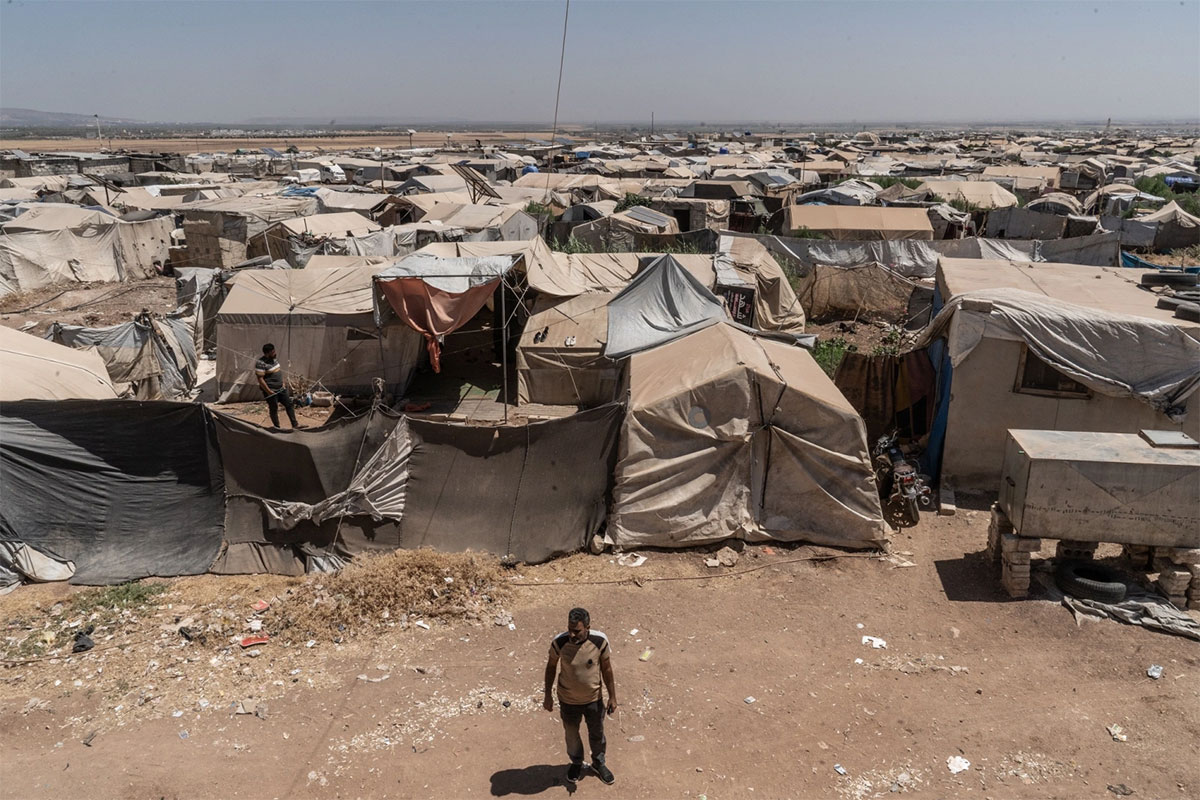 Widespread displacement in Syria continues to place girls and women at risk of violence and exploitation29 July 2024 – Syria’s 2023 earthquake put to the test the trainings on gender-based violence and mental health support that WHO has funded and organized in the country since 2018. The earthquake also prompted WHO to initiate its work on prevention and response to sexual misconduct (PRS). Under WHO’s definition, sexual misconduct includes sexual harassment, exploitation and abuse.
Widespread displacement in Syria continues to place girls and women at risk of violence and exploitation29 July 2024 – Syria’s 2023 earthquake put to the test the trainings on gender-based violence and mental health support that WHO has funded and organized in the country since 2018. The earthquake also prompted WHO to initiate its work on prevention and response to sexual misconduct (PRS). Under WHO’s definition, sexual misconduct includes sexual harassment, exploitation and abuse.
The 7.8-magnitude earthquake that struck Syria on 6 February 2023 brought death, destruction and displacement in its wake. Hundreds of thousands of people lost their homes and were forced to move to temporary shelters.
“When I arrived at the shelter where I was working, I was dismayed at the conditions people were facing. The shelter was overcrowded and had no separators. There was just one toilet for 1000 people,” recalls Dr Hala Zghaibeh, National Professional Officer and PRS focal point in the WHO Country Office in Syria. “These difficult conditions placed girls and women at risk of violence and exploitation.”
WHO Syria drew on its partnership with the Syrian Commission for Family Affairs and Population (SCFAP) to address the risk of sexual misconduct among people affected by the earthquake. WHO also initiated a new partnership to operationalize PRS activities following the disaster.
SCFAP is the only national government agency to handle social protection and it also runs the national victim and survivor support unit. Following the earthquake, SCFAP sent 150 frontline support workers – trained with funds from WHO – to places where there was a high risk of gender-based violence, to offer support and referral services to people in need.
Foundational work on prevention and response to sexual misconduct
In 2018, WHO launched trainings in Syria on tackling gender-based violence, first in Aleppo and later in 9 more governorates. Organized with the Ministry of Health, nongovernmental organizations (NGOs) and United Nations health sector partners, these trainings first had to overcome the obstacle of how to broach such a sensitive subject.
Dr Wail Ismail, Public Health Officer and PRS focal point in WHO Syria, reflects on this earlier initiative: “Gender-based violence and sexual misconduct were sensitive topics and continue to be so in many parts of the world. As a workaround in our trainings, we used language that was familiar to public health and reproductive health care providers, when supporting survivors of violence, and began by enhancing their psychosocial support skills.”
Syria has come a long way since then, navigating taboos and scepticism to reach a place where senior Ministry of Health officials now serve as focal points for PRS. In the 5 years since the initial trainings, WHO Syria has made steady progress in preventing sexual misconduct, as well as gender-based violence, by reshaping institutional responses to these issues.
The power of partnerships
 At the Aleppo health centre, women and children learn about accessing support services for gender-based violencePartnerships have been instrumental in driving Syria’s progress in PRS. An example is WHO’s collaboration with the Institute of Human Resource Management (IHRM), an NGO that supports organizations to build capacity in developing policies against sexual misconduct. It also offers trainings on such policies and can help devise a related code of conduct, making workplaces safer spaces.
At the Aleppo health centre, women and children learn about accessing support services for gender-based violencePartnerships have been instrumental in driving Syria’s progress in PRS. An example is WHO’s collaboration with the Institute of Human Resource Management (IHRM), an NGO that supports organizations to build capacity in developing policies against sexual misconduct. It also offers trainings on such policies and can help devise a related code of conduct, making workplaces safer spaces.
Through a WHO-financed project, IHRM delivered training-of-trainers sessions on PRS to 38 people from 6 Syrian governorates over 8 months in the period 2023–2024. The training has been cascaded to 565 people, chiefly from NGOs but also from the public and private sectors, helping to foster a culture of accountability and support within workplaces.
Ministry of Health adopts PRS actions
Yet another notable success has been the Syrian Ministry of Health’s uptake of PRS actions since 2023. More than 1700 public health personnel from across the country have been trained on the topic.
Dialogues and sessions with programme directors at the Ministry of Health have helped strengthen support for PRS work. The Ministry is gradually incorporating PRS as part of its strategic planning and priority setting, with ministerial focal points for PRS appointed at a high level, including the Deputy Minister for Health Affairs. A workshop held in May 2024, on development of policy and institutional capacity-building, was attended by 35 people, including the deputy ministers of health and justice.
Dr Razan Tarabishi, Director of Primary Health Care at the Ministry of Health, has been a steadfast champion of the adoption of PRS policies and actions within the Ministry. “WHO presented us with a significant opportunity to familiarize ourselves with PRS policies,” she explains. “We can now better understand the discussions on the topic at the World Health Assembly and are able to brief and support our Minister better. This is valuable knowledge for continued efforts in our country.”
Syria’s progress is reflected not only in the numbers of people trained and policies drafted in workplaces, but also in the palpable shift in attitudes. What was once taboo is now openly addressed, paving the way for survivors of sexual misconduct to seek support without fear or stigma. Through sustained advocacy and engagement, institutional barriers are coming down and PRS in Syria is now a shared responsibility.
What next?
WHO Syria will continue to strengthen its partnerships and engagement with the Ministry of Health and other government counterparts, in particular to develop stronger PRS policies and explore potential legal amendments.
WHO Syria is also working to deepen and scale up the capacities of NGOs and the public and private sectors in PRS and in strengthening assistance for survivors.
The Big Catch-Up: Syria rolls out initiative to reach millions of children missed during COVID-19 pandemic
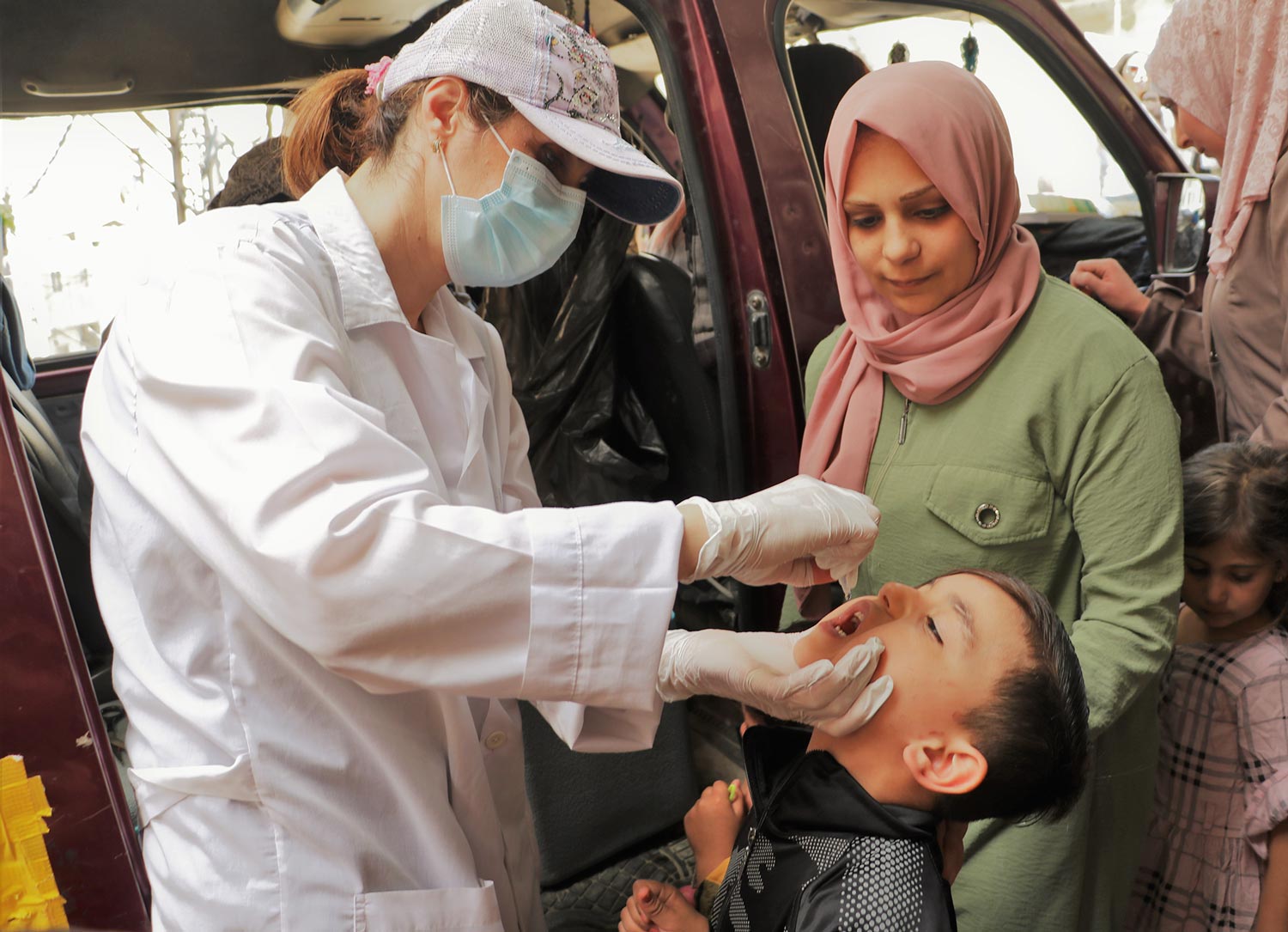 Immunization activity in Rural Damascus, Syria, 2024. Photo credit: WHO Syria23 July 2024, Damascus – The Syrian Ministry of Health (MOH), supported by WHO, UNICEF, and Gavi, the Vaccine Alliance, has launched the second round of Big Catch-Up vaccination activity this week.
Immunization activity in Rural Damascus, Syria, 2024. Photo credit: WHO Syria23 July 2024, Damascus – The Syrian Ministry of Health (MOH), supported by WHO, UNICEF, and Gavi, the Vaccine Alliance, has launched the second round of Big Catch-Up vaccination activity this week.
The Big Catch-Up is an initiative launched by global health partners in April 2023 to address the decline in childhood vaccination rates observed during the COVID-19 pandemic as a result of overburdened health systems and disrupted access to medical care. This is the second phase in Syria, following an initial phase in April this year.
During this round, about 2 million children under the age of five are targeted to be screened, and more than 300,000 are expected to be vaccinated with different childhood vaccines. The activity aims to reach children through fixed sites and mobile vaccination teams across the selected areas of coverage, with over 7,500 health workers deployed. In addition, a measles campaign will be conducted in 68 districts identified as priority districts for measles, where children will receive measles rubella / measles mumps rubella (MR/MMR) vaccines regardless of their vaccination status.
To ensure vaccine uptake, MOH Syria and partners are also rolling out proactive community engagement activities to promote vaccination of children, including through partnership with community leaders, social and mass media, as well as other influencers.
“The Big Catch-Up initiative in Syria is not only an opportunity to immunize and protect all children up to 5 years old, including zero dose children, but is also aimed at strengthening routine immunization from planning, service delivery and to monitoring systems. Gavi and our partners are committed to continuing supporting the Ministry of Health towards a strong and resilient immunization national programme, which is the essential pillar for combating disease outbreaks,” said Véronique Maeva Fages, the Senior Country Manager for Syria at Gavi.
“The Big Catch-Up initiative is a vital step in overcoming the setbacks caused by the COVID-19 pandemic and building a stronger, more resilient health system. UNICEF remains committed to supporting the Syrian Ministry of Health and our partners in this critical effort to safeguard the future of children in Syria," said Yasumasa Kimura, UNICEF Representative in Syria.
Dr Iman Shankiti, acting WHO Representative to Syria, echoed and emphasized the importance of these efforts: “Our commitment to the Syrian people is unwavering, and we stand together with our health partners to strengthen the immunization programme as a cornerstone of achieving universal health coverage”.
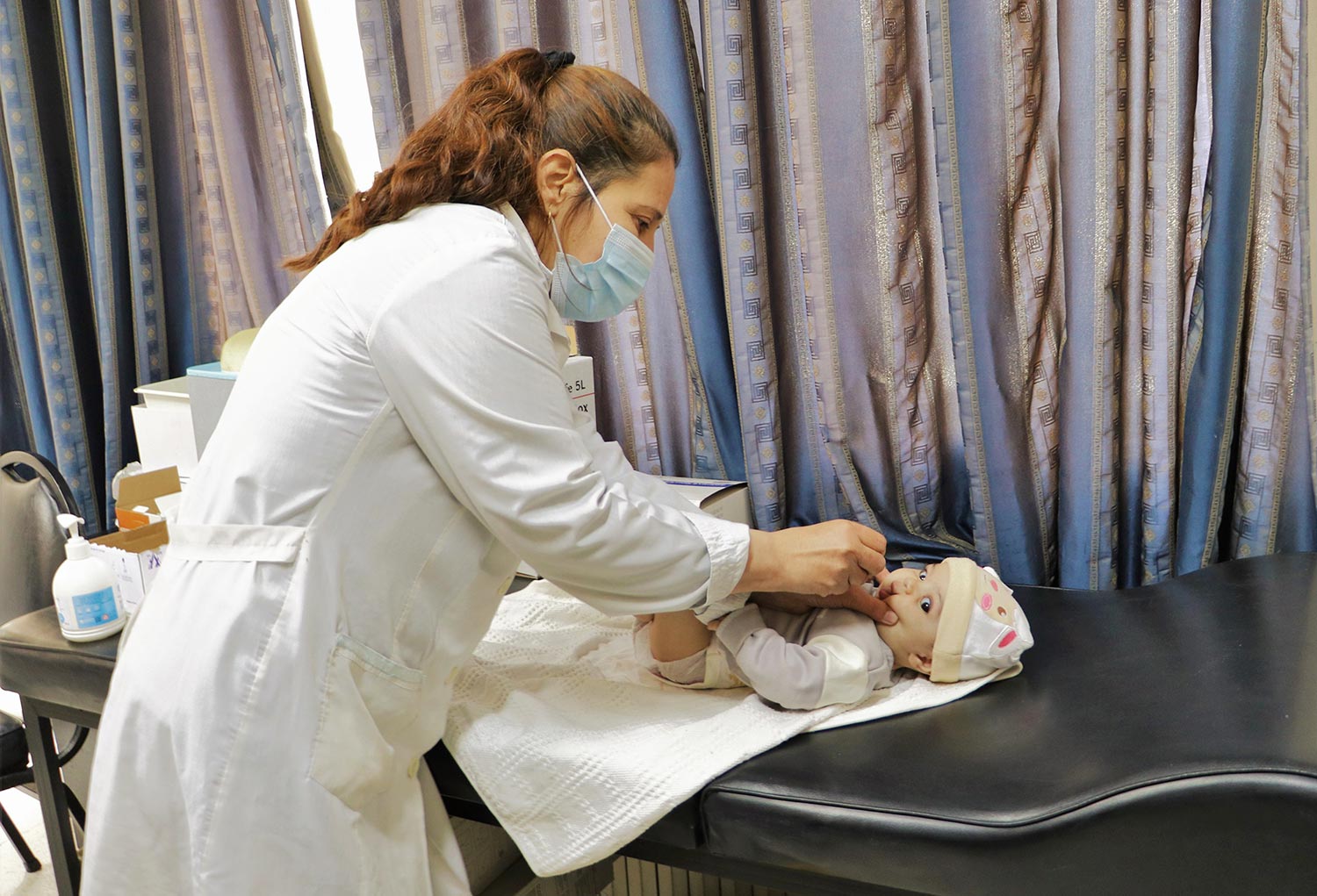 Immunization activity in Rural Damascus, Syria, 2024. Photo credit: WHO SyriaThrough global catch-up efforts supported by GAVI and other donors, partners aim to help lower-income countries close immunization gaps, restore immunization coverage to pre-pandemic levels, and strengthen immunization systems in the longer term.
Immunization activity in Rural Damascus, Syria, 2024. Photo credit: WHO SyriaThrough global catch-up efforts supported by GAVI and other donors, partners aim to help lower-income countries close immunization gaps, restore immunization coverage to pre-pandemic levels, and strengthen immunization systems in the longer term.
In Syria, the first round managed to screen the vaccination status of more than 1.8 million children and vaccinated zero-dose and unvaccinated children with the needed vaccines. Additionally, 1.8 million received the Polio vaccine (bOPV) and 1 million received Vitamin A regardless of their vaccination status.
The second round of the Big Catch Up activity coincides with a joint high-level mission by WHO, UNICEF, and Gavi, the Vaccine Alliance, to Syria. The mission is aimed at understanding the status of the current immunization programme and continuing dialogue on longer-term sustainable solutions in vaccine procurement and financing.
The next round of the Big Catch-Up initiative is slated for October this year.
About WHO
The World Health Organization works with 194 Member States across six regions and from more than 150 offices to provide global leadership in public health, promote health, keep the world safe, and serve the vulnerable. Our goal for 2019-2023 is to ensure that a billion more people have universal health coverage, to protect a billion more people from health emergencies, and provide a further billion people with better health and wellbeing. For more information about WHO and its health agenda, visit www.who.int.
About UNICEF
UNICEF promotes the rights and wellbeing of every child, in everything we do. Together with our partners, we work in 190 countries and territories to translate that commitment into practical action, focusing special effort on reaching the most vulnerable and excluded children, to the benefit of all children, everywhere.
For more information about UNICEF and its work for children, visit www.unicef.org. Follow UNICEF on Twitter and Facebook.
About Gavi, the Vaccine Alliance
Gavi, the Vaccine Alliance is a public-private partnership that helps vaccinate more than half the world’s children against some of the world’s deadliest diseases. The Vaccine Alliance brings together developing countries and donor governments, the World Health Organization, UNICEF, the World Bank, the vaccine industry, technical agencies, civil society, the Bill & Melinda Gates Foundation, and other private sector partners. View the full list of donor governments and other leading organizations that fund Gavi’s work here.
Since its inception in 2000, Gavi has helped to immunize a whole generation – over 1 billion children – and prevented more than 17.3 million future deaths, helping to halve child mortality in 78 lower-income countries. Gavi also plays a key role in improving global health security by supporting health systems as well as funding global stockpiles for Ebola, cholera, meningococcal, and yellow fever vaccines. After two decades of progress, Gavi is now focused on protecting the next generation, above all the zero-dose children who have not received even a single vaccine shot. The Vaccine Alliance employs innovative finance and the latest technology – from drones to biometrics – to save lives, prevent outbreaks before they can spread, and help countries on the road to self-sufficiency. Learn more at www.gavi.org and connect with us on Facebook and X (Twitter).
Media contacts:
Gavi: Collins Mwai
UNICEF: Gulyalek Soltanova
WHO: Tania Seburyamo,


